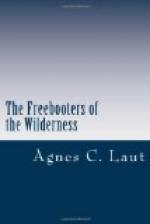“What’s that, Wayland?”
“Only the snow slides loosened by the noon-thaw slithering down the Pass of Holy Cross;” and somehow, he could not but think of what she had said . . . the law of the snow flake sculpturing the rocks.
The horses cropped audibly over the grasses—waiting. The little mule looked back—also waiting. A whelming impulse, part of the spirit to drink of her inspiration, part of the flesh to drink of her touch—came over him to ride down to the ranch house, the MacDonald ranch house, to see her—just once before setting out on the Long Trail.
“Well,” he said; “which way, Mr. Matthews?”
The old Britisher moved thoughtfully towards his broncho.
“We’ll try y’r sheriff—at least, we’ll try him first.”
And again the Ranger laughed.
“Don’t laugh, man! D’ y’ know what it means when men are driven outside the line of law?”
The horses waded in midstream and reached down drinking, champing on their bits.
“Well—what does it mean?”
He saw the blue of the mountain stream swirl and whirl and eddy over the sun-dyed pebbles, singing the law of the far mountain snows.
“God knows,” answered the old man slowly. “It means disrupture. We slew our kings in olden times; but ye are a many headed king in this land! It means—perhaps, ye call it Anarchy to-day.”
The yellow noon-day light sifted through the cottonwoods jewel-spangled on the crystal blue River. The Ranger always knew the character of the mountains from the River: silty and milky-blue from glaciers; crystal and green-blue from the snow. And they rode away up the Valley from the ranch houses towards the Pass, out beyond the bounds of the National Forests with the trees marked two notches and one blaze; gradually up the narrowing trail fringed by the shiny laurel bushes; with the mountains closing closer and the spiced balsam odor raining on the air a sifted gold dust of sunlight. At intervals, came the dull rumble of the snow slide, the far reverberation, the echo of the law of the snow flake rolling away the stone; the smash of the great law drama, the titans behind the mountains.
It was one of those frequent mountain formations where a Valley seems to terminate in a blank wall. You turn a buttress of rock, and you find the sheer wall opening before you in a trail that climbs to a notch on the sky line between forested flanks. The notch of blue is a Pass.
“Anyway, Mr. Matthews, we are splitting the air, now! We are doing more than sawing air.”
They had put their horses to a sharp trot along the trail winding up the River. The water was gurgling over the polished pebbles with little leaps and glints of fire. Presently, the mountains had closed behind them. The River was tumbling with noisy rush in a succession of cascades, and the trail wound back from the rocky bank through circular flats or what were locally known as “bottoms.”




